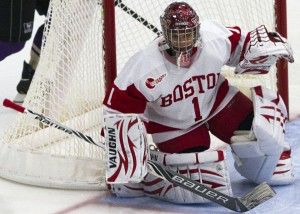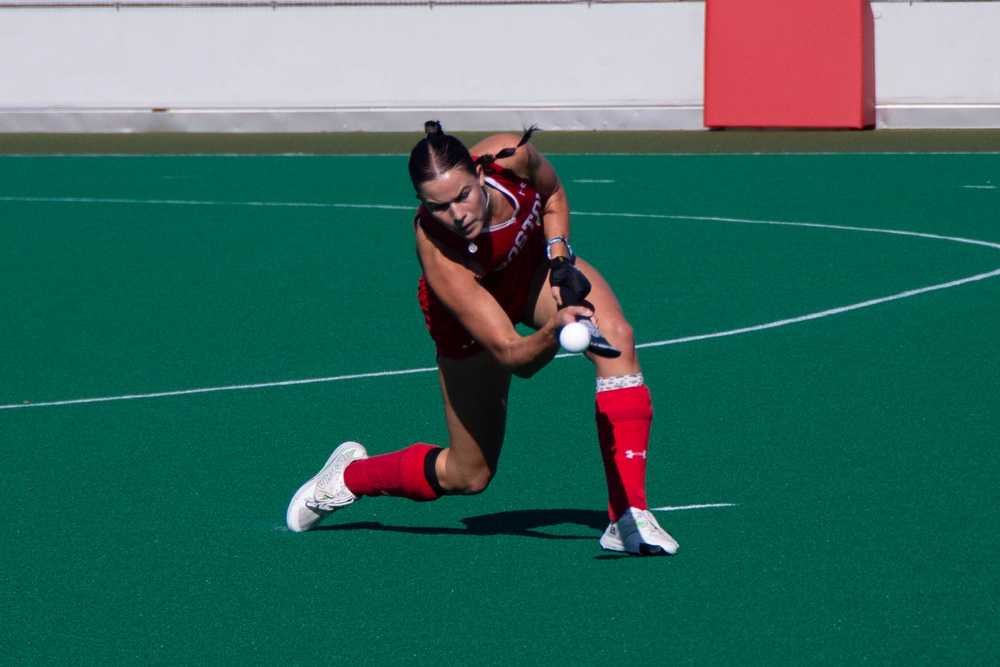
It’s 3:00 a.m. in June in Fort Knox, Kentucky. The 90-degree day has cooled down some, but it is still uncomfortably warm, and no one is awake. Except for Kerrin Sperry. She’s doing sprints.
She runs from one porta-potty to the other, taking advantage of the only hardtop surface in the camp, again and again. She’s at Reserve Officers’ Training Camp, but these sprints aren’t to train her for the Army. They are to train her for field hockey.
After 14 years of ice hockey and four years of holding down the fort in between the pipes for the Boston University women’s ice hockey team, Sperry is moving on. With a career .922 save percentage, a pair of Hockey East Tournament MVPs and a trio of Hockey East Championships, the 22-year-old North Reading native will be doing some different things in her final year at BU, namely finishing up a two-year masters program and completing a two-year ROTC program as well. And, also, playing field hockey.
“I loved playing field hockey in high school, and I loved watching field hockey while I was an undergrad here,” Sperry said. “When I started thinking about what my last year at BU was going to look like, there was this athletic hole.
“I really thought about what could I contribute to another team, and I was like, ‘Well, I’m not the best field hockey player around, alright, but I feel like I’ve had so many experiences that I feel like I want to share with another team.’”
She expressed interest in joining the field hockey team last winter, reaching out to BU coach Sally Starr and letting her know what the situation was — that she was coming back for a fifth year of school and was eager to try and play for her.
“I told her [to] take two weeks off at the end of the ice hockey season last year and then come and see us,” Starr said. “She did that, and she really worked hard, took a lot of individual sessions with both my [assistant coaches] and worked really, really hard.”
Sperry’s work ethic and focus was something BU women’s ice hockey coach Brian Durocher noticed and something he highly praised her for, not just on the ice, but in everything she does.
“There are some people who say all the right things, or some people who are blue-collar workers, or some people who lead through their talent,” Durocher said. “She was somebody who definitely led through her work ethic. She was always somebody who worked hard in the gym. She was somebody who fought on the ice. She wasn’t the biggest goalie we’ve ever had. She probably wasn’t the most technically sound goalie you’ll ever see, but she was ultra-competitive.
“That’s probably where she was a leader,” Durocher continued. “She wasn’t the kid who was the clubhouse leader or the ‘bringing everybody together’ leader, but without a doubt, she was a leader from her competitive nature and her work ethic.”
But hard work and competitiveness are not the only things that helped Sperry earn her spot on the team. Durocher stressed the amount of effort that she put into being the best she could to “earn her stripes,” and prove that she was skilled and committed enough to play for Starr. She was not “handed a free pass” because of her character. She worked her way on.
“[Sperry] proved enough to them that she could be a valuable piece, even if it’s in a reserve role or backup role or practice role,” Durocher said. “Those people are very, very important in college athletics, and she earned her keep, and I think they were surprised probably to some extent but mostly appreciative of what she did.”
The transition from ice hockey to field hockey is no joke, though more so physically than mentally for Sperry.
It was a different kind of training; one that focused more on movement and being able to run as opposed to skate, and then learning how to play the sport at such a high level when you haven’t done so in years is a feat in and of itself. Mentally, though, Sperry found herself having an easier time making adjustments.
Sperry acknowledged that there’s definitely a change in the role she’s filling this year. She is no longer the last line of defense, the “all-pressure player,” but instead is someone who is now taking on a more supportive and mentoring role.
“I had so many people to look up to when I played on the ice hockey team who played that role all my four years, who were always the ones in the locker room between periods making sure that I was doing okay, talking to me, who were cheering on the sideline, who were supporting the team no matter how many minutes they got, and I was able to look to their experiences and be like, ‘Look, they did it, and they did it well, and it made me super successful,’ so mentally that hasn’t been too tough,” Sperry said.
In addition to leading by example in terms of how hard she works, Sperry also noted that in her four years on the ice hockey team, she realized that being a teammate is not just about being at practice and doing the drills or coming to the games. It is something more, and she’s confident that everything she’s learned through hockey can benefit her new team.
“People look to you. People look to each other to find strength to accomplish things that they don’t think they can accomplish by themselves,” she said. “What I can bring to field hockey is no matter if I’m on the bench, on the field, or just in the locker room, I feel like I can help my teammates do things that they don’t think they might able to do themselves, and that’s what my bottom line is. If I can contribute something, anything, it’s to try and make my teammates believe in themselves.”
Flash forward to Sept. 2014. The former women’s ice hockey netminder smiles in the lobby of Walter Brown Arena after coming from a team meeting, with a Box O’ Joe from Dunkin’ Donuts in each hand.
“Thank you for everything this morning,” BU field hockey assistant coach Tracey Paul said.
“Any time, Trace,” Sperry replies. She had brought doughnut and coffee to the gathering for everyone.
“Sperr, give me a hug,” BU associate coach Sarah Shute says, thanking Sperry as well.
“No problem, Shuter.”
She’s well on her way to an eventful season and an even more eventful ending to the year, graduating in May, getting commissioned when she finishes ROTC and then getting married, all within three weeks of one another.
“I hope I don’t get a pimple or something,” she laughs. “[That’s] a lot of pictures.
“I’m just really thankful for the opportunities I’ve gotten at BU,” Sperry continued. “BU’s given me like everything, and I’m going to graduate from here with a bachelors degree, a masters degree, an officer commission, my wife, four years of college ice hockey, a year of field hockey that I never thought I was going to get. I’m the luckiest person in the world.”






















































































































Bryan Stone • Sep 15, 2014 at 11:29 pm
Captivated by the compelling prose and excellent reporting here. Judy Cohen is an amazing journalist, and this story is proof.